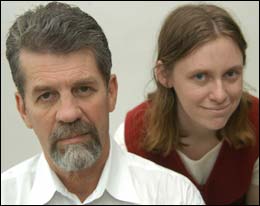Lloyd Brown, editorial page editor at the Florida Times-Union since 1993, has resigned after a task force established by the paper found three instances of plagiarism and many other instances of lack of complete attribution. The task force was formed in the wake of Folio Weekly's Oct. 12 cover story, written by a former Times-Union staffer, which accused Brown of publishing editorials with portions lifted directly from documents produced by right-wing groups. In a letter that appears in the Times-Union's Nov. 2 edition, publisher Carl Cannon writes, "I have a high level of respect for [Brown's] philosophy."
When Philadelphia City Paper publisher Paul Curci conducted a national search for a new editor, he spoke to "no less than three dozen candidates," according to his open letter in the paper's latest issue. With input from his staff, he handpicked Philly native Duane Swierczynski, who worked at Philadelphia magazine and Men's Health before moving on to New York and an associate editor position at Details. Curci says that Swierczynski "made good in Philly, elevated his game in New York and chose to return to the city he loves to do what he does best -- lead young writers to excellence."
The recent acknowledgments of circulation inflation by three prominent newspaper companies have prompted at least a half-dozen other chains to install safeguards intended to bolster confidence in their circulation figures. The new policies by the chains - including Knight Ridder, the McClatchy Company newspapers and E. W. Scripps - have all been put in place in advance of Nov. 1. That is the date when the Audit Bureau of Circulations, which acts as both an industrywide clearinghouse and umpire, is scheduled to release March-to-September circulation figures for about 1,000 daily papers.
Folio Weekly's Oct. 12 cover story accuses the Florida Times-Union -- and editorial page editor Lloyd Brown, in particular -- of publishing editorials with portions lifted directly from documents produced by right-wing groups. The article, penned by former Times-Union editorial writer Billee Bussard, has prompted the Jacksonville daily to launch an internal investigation, reports Editor & Publisher. Times-Union publisher Carl Cannon says, "I would never expect to find plagiarism at our paper, and I would be surprised if we did in this case." Brown tells reporter Joe Strupp: "I think we try to base our editorials on fact, and we have to get them from somewhere."
Duane Swierczynski is the new editor of Philadelphia City Paper, filling the spot left vacant when Howard Altman was fired in June 2004. Adding an interesting twist to the hiring is that in 1999 the paper published a mildly scathing rebuke regarding the publication of a phony article Swierczynski wrote for Philadelphia magazine about a gay Mummer. (Mummers are blue-collar guys who paint themselves to look like super-mimes and march through Philly each Jan. 1.) Publisher Paul Curci tells Dan Gross of the Philadelphia Daily News that City Paper staffers deem the long-ago hoax "a nonissue."
Despite a proliferation of cultural activity, arts and entertainment coverage in most daily newspapers has remained constant, and in some cases decreased, the National Arts Journalism Program at Columbia University says in its new study, Reporting the Arts II: News Coverage of Arts and Culture in America. Summarizing their findings in the Los Angeles Times, the report's authors say hope lies with public radio, the Internet and alternative papers. "The alternative press, once derided by mainline news outlets, has also proved so successful at covering local arts events that media giants such as Tribune Co. and Gannett have started publications that mimic those brash competitors," they write.
Russ Smith, founder of Baltimore City Paper and co-founder of New York Press, talks to Gawker about the state of alternative papers. He thinks the industry is dealing with "the brain drain of talented youngsters who, 20 years ago, would be fresh blood but are now involved with Internet projects." Smith then tells writers Andrew Krucoff and Chris Gage that editors hoping to sustain alt-weekly success need to "focus on the quality of writing, rather than knee-jerk politics and Quentin Tarantino hagiography."
Freelance journalist Becky Oberg wanted to expand her reportage for NUVO, an Indianapolis alt-weekly, into a book. Carlo DeVito, publisher of Chamberlain Bros., a Penguin imprint, was looking for new projects. Despite the fact that Oberg was, in her words, "an unknown, unagented, first-time author," DeVito called her and asked if she'd turn her story about an Army private's desertion to Canada via an "underground railroad" into a book. Why was a publisher scouring alt-weeklies for book ideas? Says DeVito: "We're always looking for a good story and a new point of view, and that's what a lot of these papers express."
Catherine Nelson, associate publisher of AAN member Shepherd Express in Milwaukee, Wis., is scheduled to deliver a lecture titled "There Are Alternatives" at the Pennsylvania Newspaper Association convention next month. The PNA Web site describes Nelson, who was formerly publisher of two Pittsburgh alt-weeklies that went out of business, as "an industry guru on alternative papers." In addition to her position at Shepherd Express, Nelson presently serves as publisher of the new, daily-owned Core Weekly, which competes with AAN member Isthmus in Madison, Wis. (Scroll down the linked page to read about Nelson's lecture.)
- Go to the previous page
- 1
- …
- 23
- 24
- 25
- 26
- 27
- 28
- 29
- …
- 42
- Go to the next page

